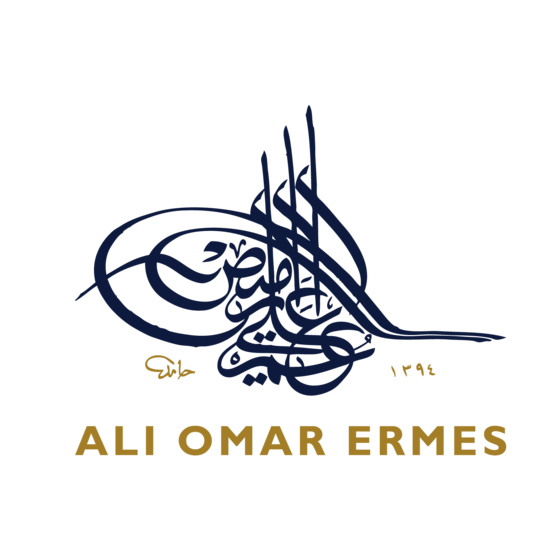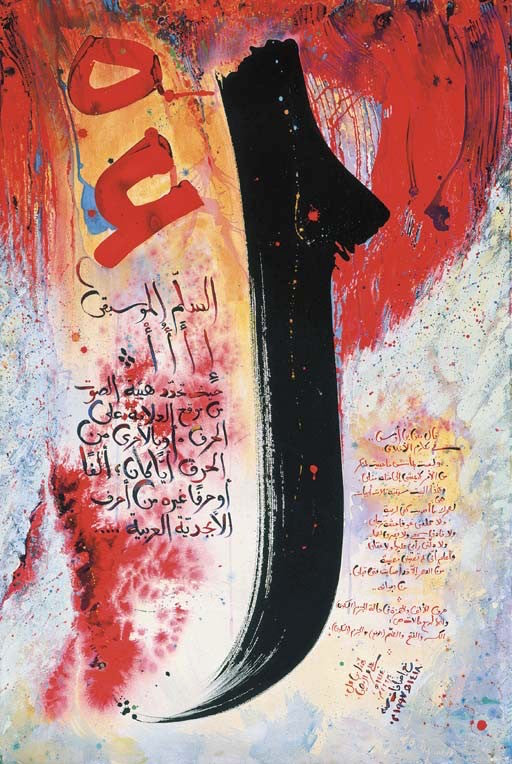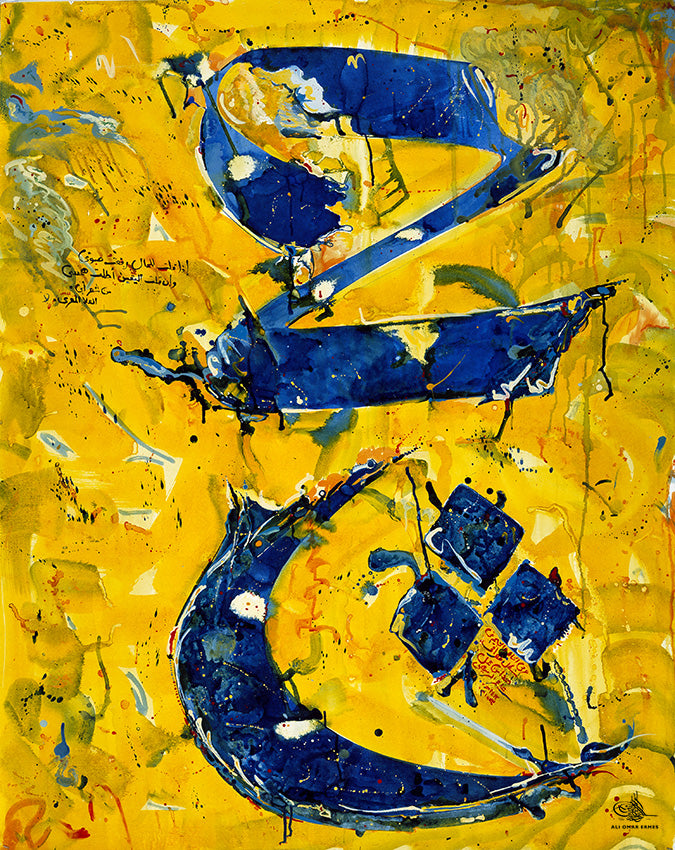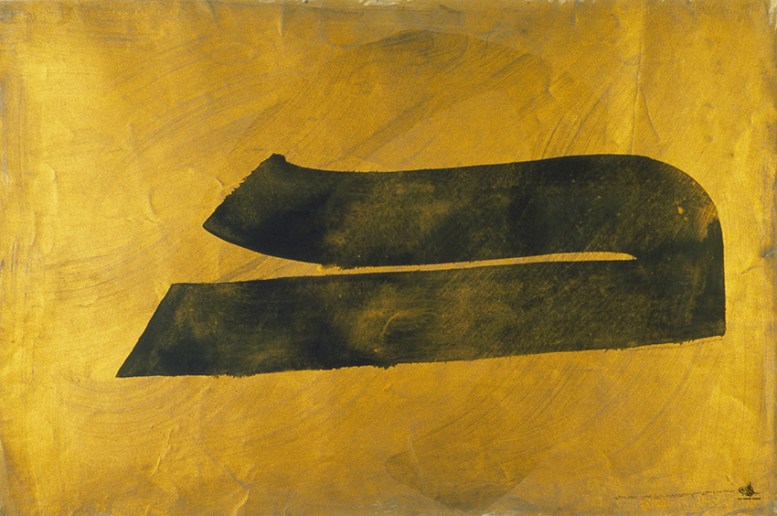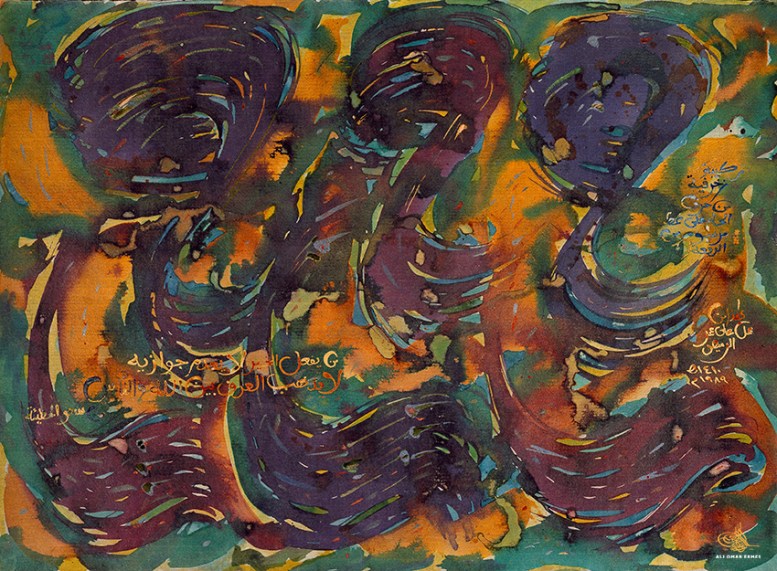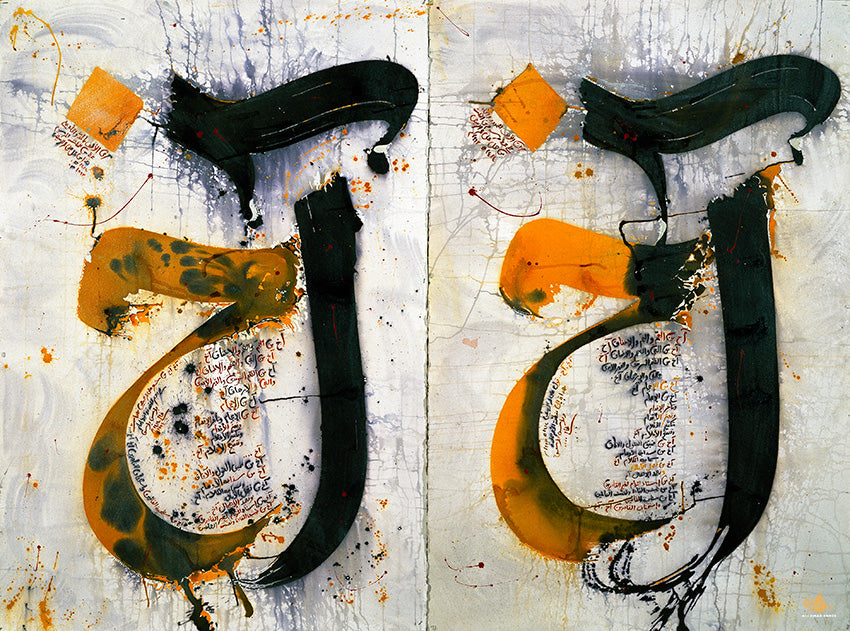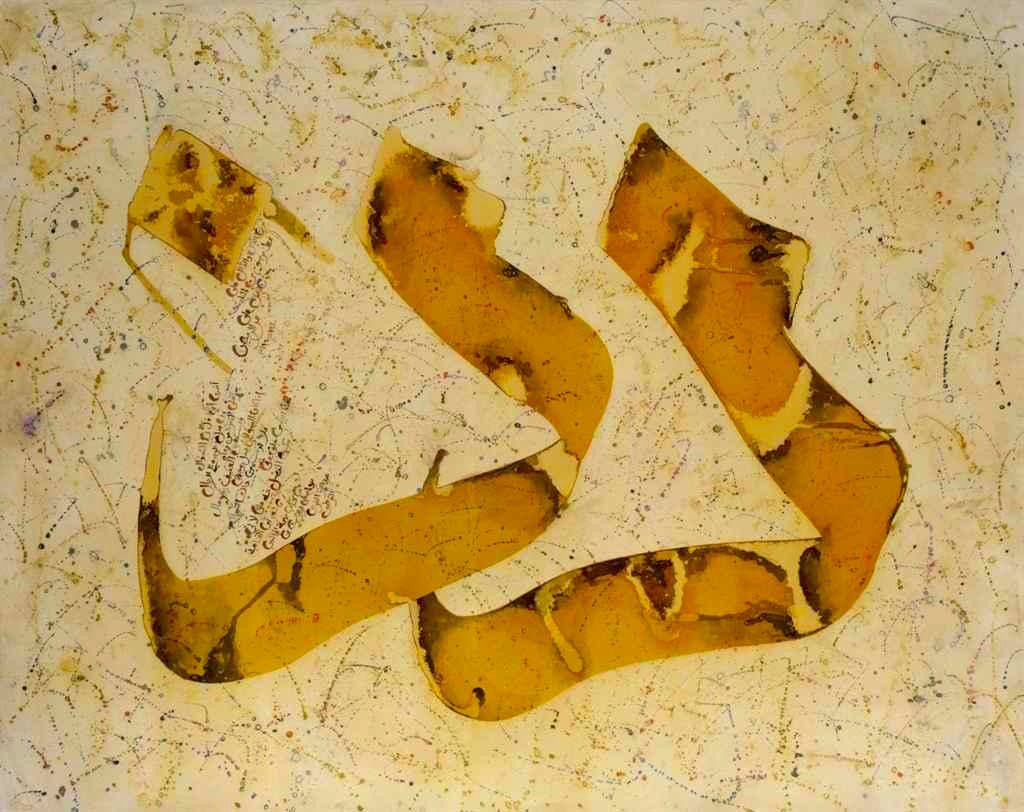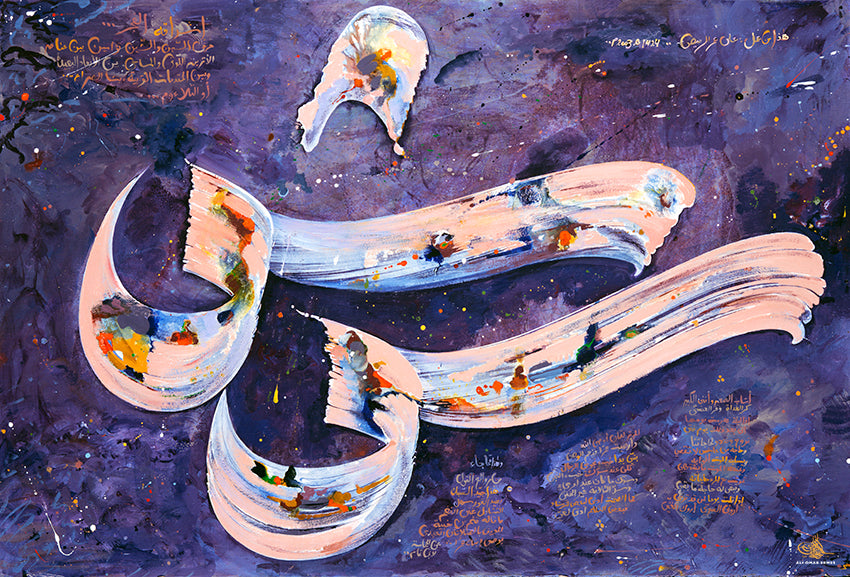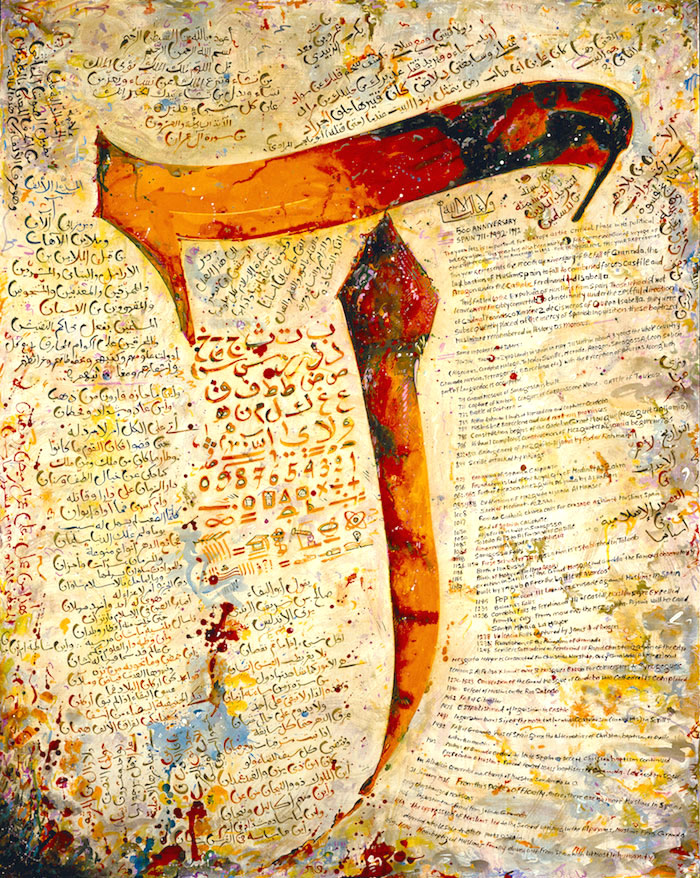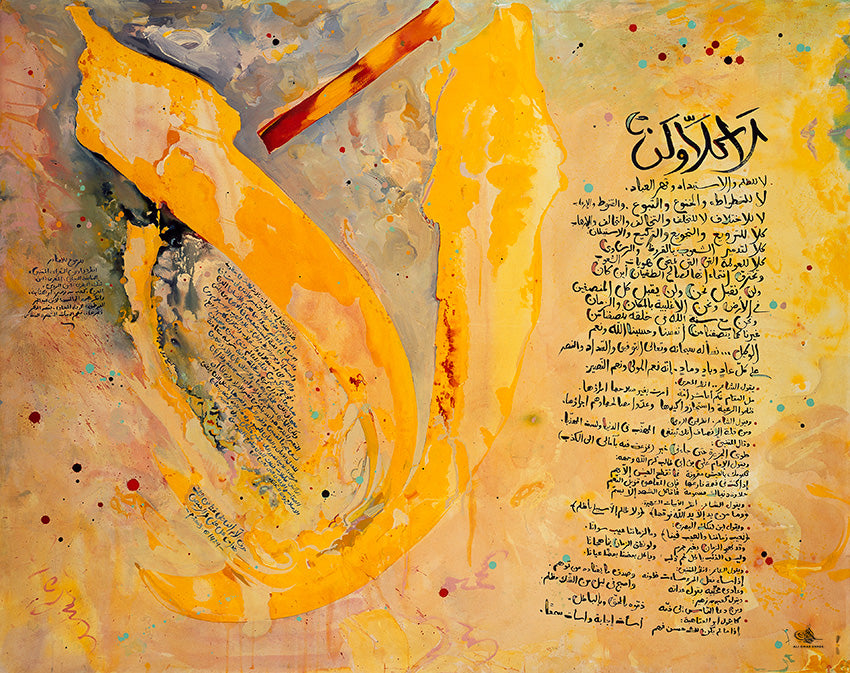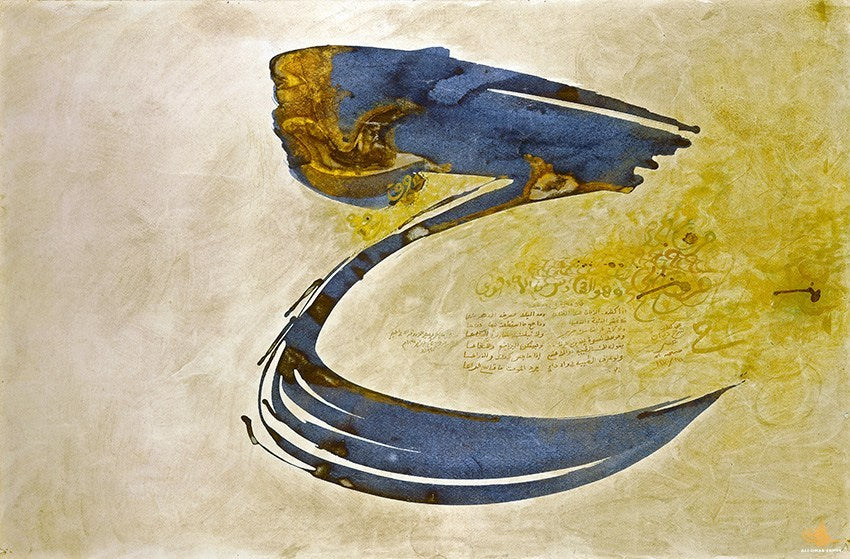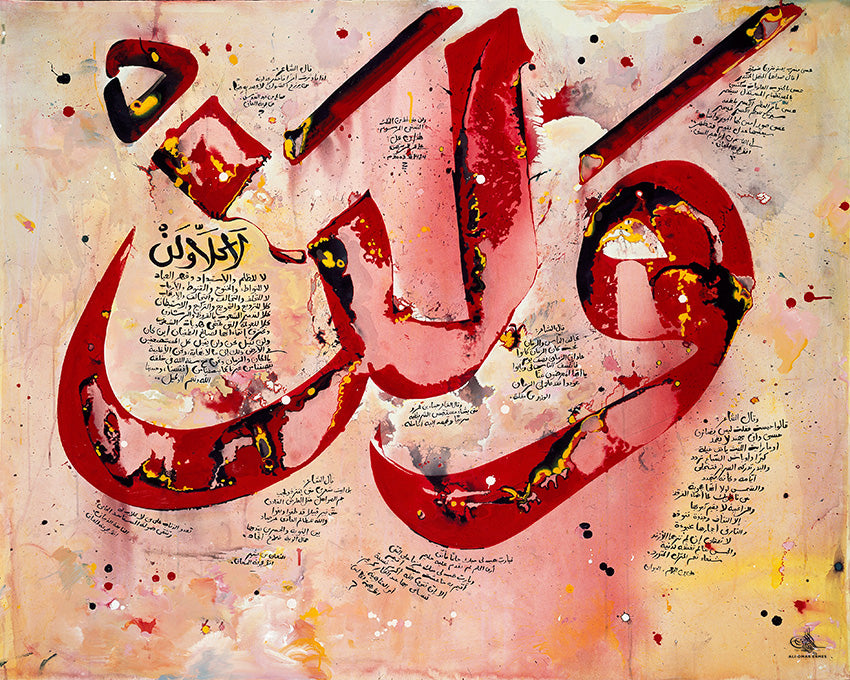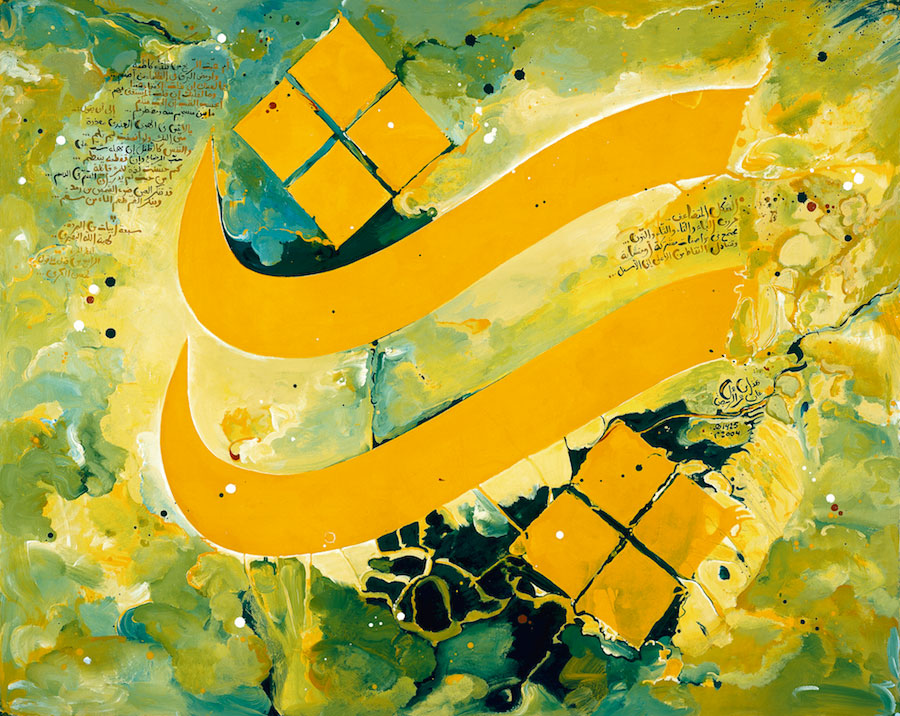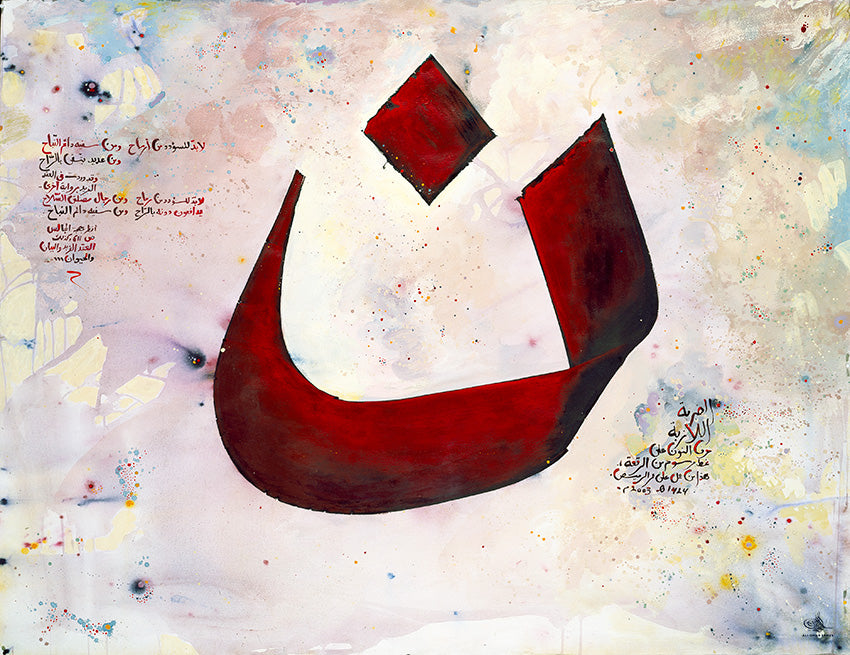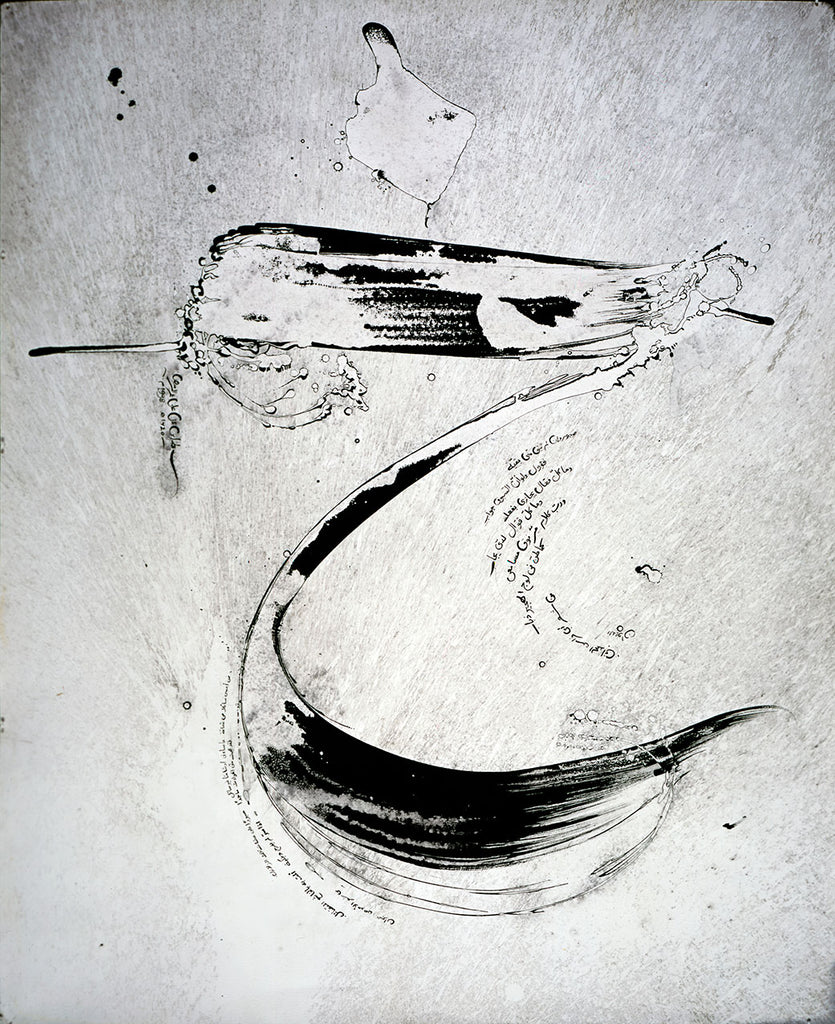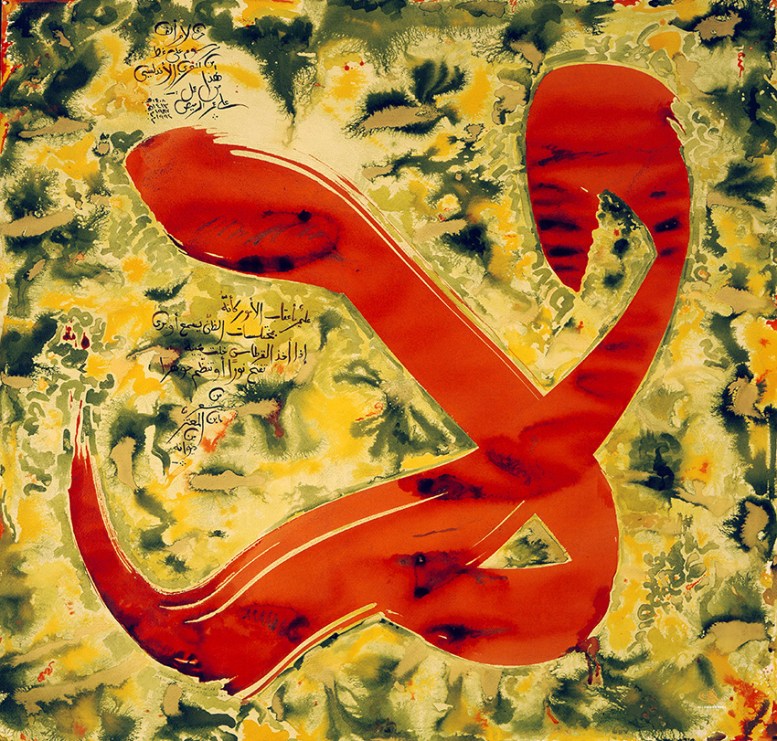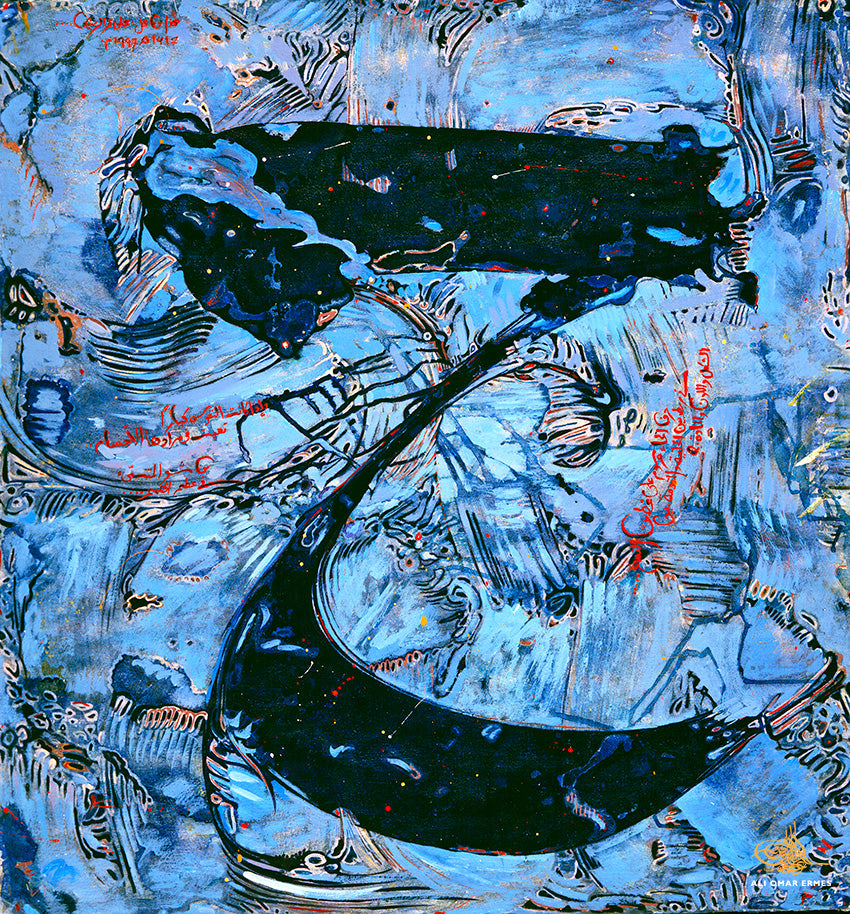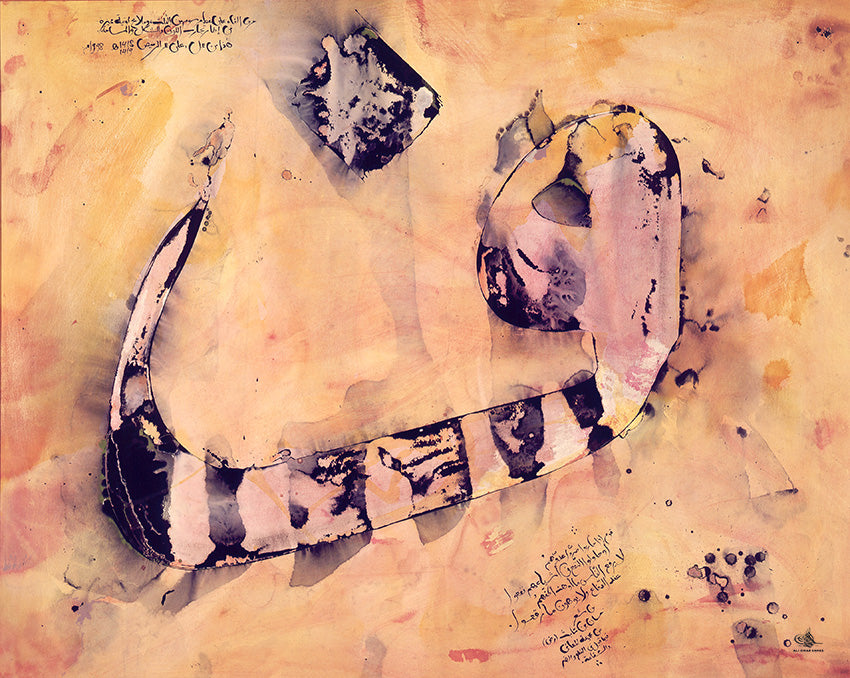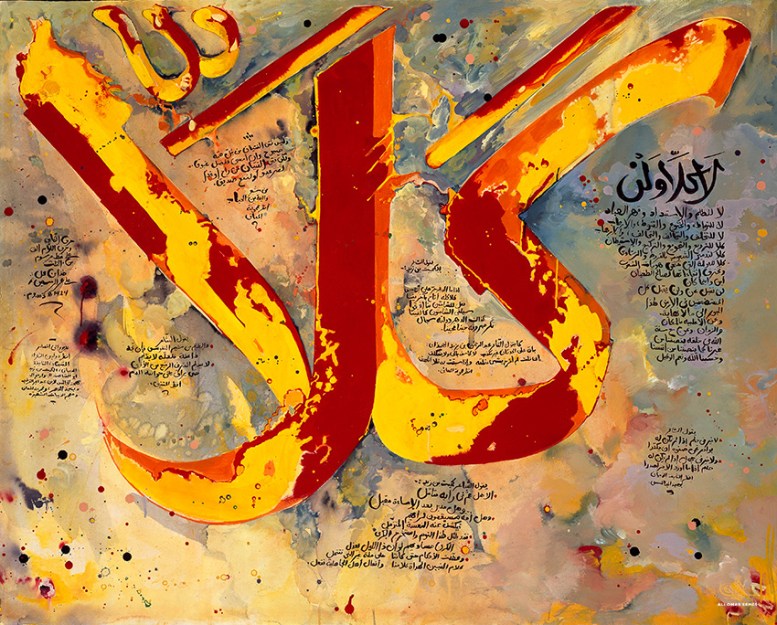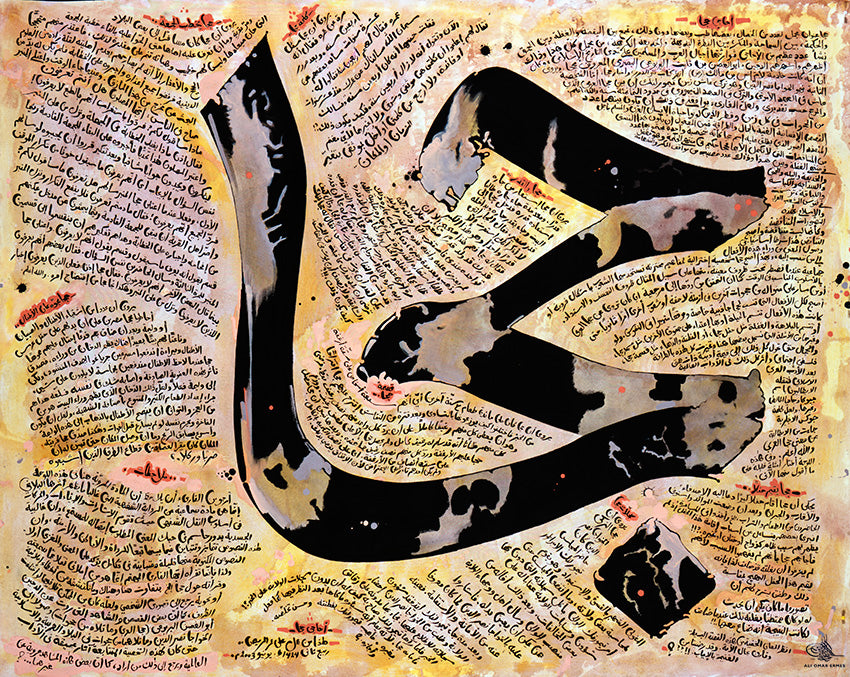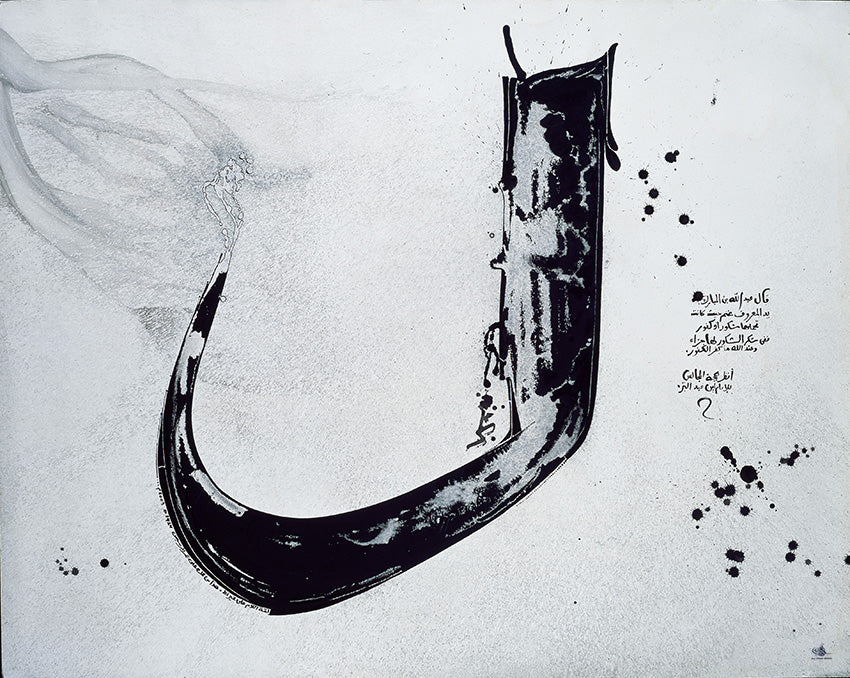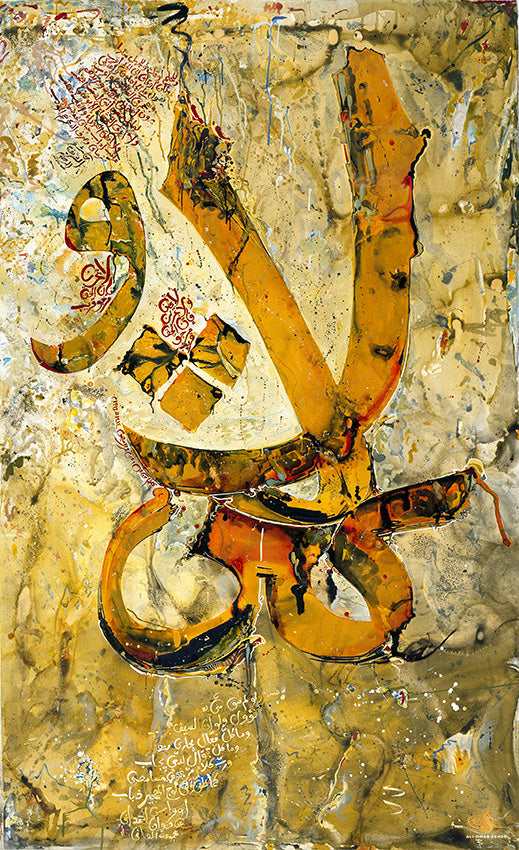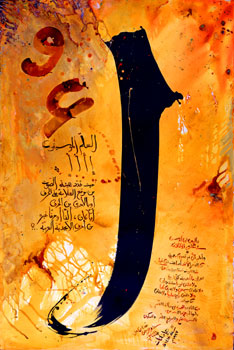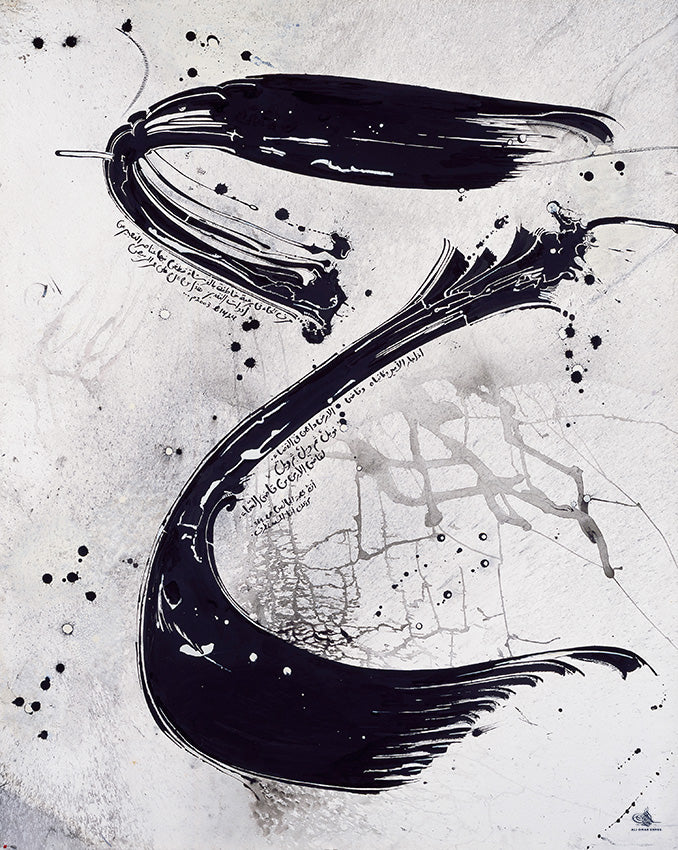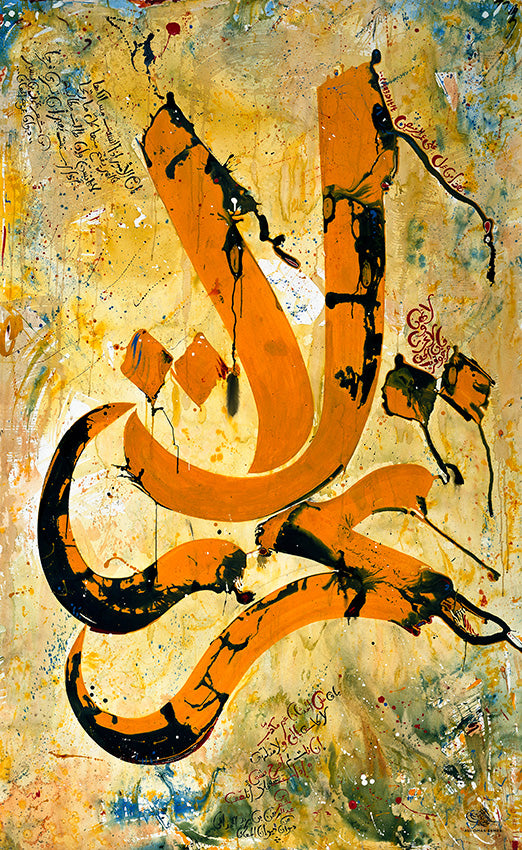Alif Sucoon
The poem written by Muaan Ibn Aws, one of the most influential poets in Arabic literature, speaks out against corruption and social decay, declaring the poet's stance on honor. The artwork captures the emotion and urgency of the poem, inviting the viewer to consider their own values and beliefs."
Tughra: Whispers of Wisdom: An Artistic Tribute to Abul Ala Al Ma’arri
Harf Ul Dal
This breathtaking piece by Ali Omar Ermes showcases the versatility and depth of the Arabic language through the use of a single stroke technique. Through this technique, Ermes is able to convey a range of emotions and expressions that range from the simplest and most direct to the most complex and nuanced.
Harf Al-Haa: Colour in Motion
"Harf Al-Haa: Colour in Motion" is a vibrant and thought-provoking artwork by Ali Omar Ermes that explores the themes of good deeds and rewards. The inscription from a poem by the poet Al Hutayya promises rewards in this world and the hereafter for anyone who delivers a good deed, inviting viewers to consider the impact of their actions on others.
This original artwork, created in 1989, measures 90cm x 60cm and is crafted from mixed media on paper. It is currently in the possession of a private collector in Malaysia, where it continues to inspire and engage viewers with its powerful message.
Aaakhen Akh!
"Nonetheless, as the double-framed picture moves sideways and the funereal black of the aleph, with its roots fanning out into some heart's core, assumes more density and pointedness, its maddah (sign over the aleph) seems to release a fat drop of black blood and its roots break free, while the kh on the left takes on darker smudges as it comes in to contact with the open spaces. Here the cry of anguish is itself transformed beyond an individual's sense of distress to a wider, universal articulation of grief and desperation, perhaps in parallel with Munch's 'The Scream', that very emblem and herald of our modern anxiety, alienation, and despondency."
Ad Dal and Az Zal: Self-Sustenance and Self-Reliance
The twin letters of Ad Dal and Az Zal feature poems by the wise and well-quoted poet Abul Atahiyah, who argues that self-sustenance, or complete self-reliance, is one of the sweetest and most important things to have. It gives one self-respect and dignity, and is something that is hard to come by. In this artwork, created by Ali Omar Ermes in 1990, Abul Atahiyah's words are brought to life through the medium of acrylic and ink on paper, creating a visually stunning and thought-provoking piece. This original artwork, measuring 150cm x 120cm, was sold at auction to a private collector.
The Dawn Break: The Sweet Poison of Life - An Artistic Exploration
Through its use of color and sound, "The Dawn Break" invites the viewer to consider the complexities of life and the role of art in expressing these complexities. The artwork, which was created in 2003 and measures 150cm x 100cm, is crafted from acrylic on paper and is mounted on canvas. It is currently in the possession of a private collector.
Alif El Ahat: A Tribute to the Expulsion of Muslims from Spain
La (No): A Call to Justice and Unity
"La (No): A Call to Justice and Unity" is an artwork that invites the viewer to consider the importance of rejecting domination, terrorism, corruption, and environmental and cultural abuses. It encourages us to face the facts and speak out against injustice, and to strive for a world that is fair and just for all.
At the heart of this artwork are lines of poetry that reject hypocrisy and double standards, and call on us to take action to bring about peace and harmony in the world. These poems remind us that we are all in this together, and that by working together and speaking out against injustice, we can create a world that is full of honor and satisfaction.
Measuring 150cm x 120cm and crafted from acrylic on paper, "La (No): A Call to Justice and Unity" is an artwork that invites the viewer to consider the importance of rejecting injustice and working towards a more peaceful and harmonious world. It currently resides with a private collector in Morocco, where it continues to inspire and engage the viewer's imagination.
The Blue Haa: A Romance of Courage and Chivalry by Antar ibn Shaddād
"The Blue Haa: A Romance of Courage and Chivalry by Antar ibn Shaddād" is a stunning artwork that brings to life the poetry of the famous pre-Islamic Arab warrior-poet, Antar ibn Shaddād. Created by artist Ali Omar Ermes in 1979, this original artwork measures 100cm x 80cm and is crafted from acrylic and ink on paper. It currently resides with a Middle Eastern Royal Family, where it continues to captivate and inspire viewers with its depiction of Antar's journey and his famous line, "I am the son of the brave and the descendant of the noble."
Here are a few examples of Antar's poetry that showcase his bravery, martial prowess, and love for his wife, Abla:
"I am the son of Shaddad, the lion of the battlefield
I am the hero of the tribe, the one who strikes fear into the hearts of my enemies"
"I am the one who braves the dangers of the desert, fearlessly facing any challenge
I am the one who stands tall in the face of danger, refusing to back down"
"I am the one who rides into battle, my sword drawn and my heart full of courage
I am the one who faces my enemies head on, never backing down"
"I am the one who loves Abla with every fiber of my being, my passion burning bright"
Wa Lan: A Tribute to Global Justice
"Wa Lan: A Tribute to Global Justice" is an artwork that celebrates the importance of rejecting domination, terrorism, corruption, and environmental and cultural abuse. This piece invites the viewer to consider the need for honesty, fairness, and justice in order to create a more peaceful and harmonious world.
At the heart of the artwork are lines of poetry that express the idea that we are all in this together, and that we need to work towards a world where everyone can live in peace and harmony. These poems remind us that we must face the facts and the systems and people behind injustice, and reject hypocrisy and double standards in order to create a more just world.
Measuring 152cm x 122cm and crafted from acrylic on paper mounted on canvas, "Wa Lan: A Tribute to Global Justice" is a powerful and thought-provoking artwork. It currently resides with a private collector, where it continues to inspire and engage the viewer's imagination.
Multiple Forms: A Homage to the Life of the Prophet Muhammad
Ali Omar Ermes, one of the foremost painters of our time, has captured the essence of this devotion through the use of intricate and expressive forms. Measuring 152cm x 122cm and crafted from acrylic on paper mounted on canvas, "The Poem of the Cloak: A Tribute to the Prophet Muhammad" is a beautiful and thought-provoking artwork that invites the viewer to consider the power of love and devotion in the Islamic faith. It currently resides with a private collector, where it continues to inspire and engage the viewer's imagination.
Noon - the Sharp and Competent: A Tribute to Mental Preparation
This stunning artwork invites the viewer to consider the importance of mental preparation in the creative process. At the heart of the piece are poems by the esteemed poet Al Jahiz, which explore the role of mental preparation in achieving a satisfactory result. These poems remind us that the key to success is not just in the technical skills and materials we use, but in our ability to focus and prepare our minds before embarking on a creative project. Measuring 150cm x 114cm and crafted from acrylic and ink on paper, 'Noon - the Sharp and Competent' is a thought-provoking artwork that invites the viewer to consider the role of mental preparation in the creative process.
Al-Khaa Al-Ashhab: An Ode to Resilience
In 'Al-Khaa Al-Ashhab,' Ali Omar Ermes masterfully captures the essence of the Arabic letter khaa, evoking a sense of swiftness and speed through its elegant brushstrokes. The monochrome palette adds depth and complexity to the work, while lines from a poem by Abi Faris Al-Hamadani add another layer of meaning, describing the warrior's willingness to overcome pain and disappointment and his commitment to remaining positive during hardship. This powerful masterpiece serves as a reminder of the resilience and strength that can be found within us, and the importance of treating others with kindness and compassion.
Lam Alif Libnul Muttazz: A Tribute to the Power of Contrast
Al Haa ‘informal Debate’ - A Tribute to Ambitious Dreams
"Great souls carry enormously ambitious dreams But all that for the misfortune of their earthly bodies" - Abu Al Tayyib Al Mutanabbi
This excerpt, taken from a line of poetry by Abu Al Tayyib Al Mutanabbi, explores the idea that the aspirations and dreams of the soul are boundless and unstoppable, but are often held back by the limitations of the body. It speaks to the universal human experience of striving for greatness and the challenges that we all face in trying to realize our dreams. This thought-provoking excerpt invites the viewer to consider the power of ambition and the human desire to achieve greatness, and serves as a reminder that, while our earthly bodies may have their limitations, our boundless and ambitious dreams are a force to be reckoned with.
Letter Form Fa: A Tribute to Effective Action
"There are those who can do what they do in the most effective way - decisive and clear, they stand tall. Unable to be undone or bested in opinion or political judgment, they are a force to be reckoned with." - Hassan Ibnil Thabit
This poem by the esteemed Islamic poet Hassan Ibnil Thabit celebrates the unstoppable spirit of those who are able to act with clarity and conviction. These individuals are unafraid to face the challenges that come their way, and stand tall in the face of adversity. With every step they take, they grow stronger, knowing that they are guided by the divine and protected by the Most High. They refuse to be swayed or deterred, and are unstoppable in their determination to overcome any obstacle that comes their way. This excerpt serves as a tribute to the strength and conviction of those who are able to effectively and decisively achieve their goals, and serves as a reminder that we all have the power to overcome adversity and achieve greatness, as long as we stay true to our convictions and remain unstoppable in the face of challenges.
Kalla
"Kalla: A Call to Action for Justice and Peace" is an artwork that invites us to consider the many different challenges facing humanity today, and to work together to create a more just and fair world. Through lines of poetry that speak to the need for honesty and fairness, this piece calls on us to reject hypocrisy and double standards, and to hold accountable those who seek to sow division and discord. It reminds us that we are all in this together, and that it is only through working together and standing up for what is right that we can create a world that is more just and more peaceful. "Kalla" is a powerful and thought-provoking call to action, inviting us all to work together to create a better world for ourselves and for future generations.
Ahaje Juha: The Enduring Legacy of Humor and Wisdom
"Ahaje Juha: A Celebration of Humor and Wisdom" is an artwork that pays tribute to the enduring legacy of Juha, a beloved figure in Arabic literature known for his wit and wisdom. This vibrant and memorable piece celebrates Juha's enduring influence and the many talented individuals who have followed in his footsteps, from Al Khawaja Nusserudin to the Italian Jokha and beyond. It invites us to consider the many different ways that humor and laughter can bring joy and light to our lives, and to embrace the power of wit and wisdom as a means of coping with the ups and downs of life. "Ahaje Juha" is a celebration of the enduring legacy of humor and wisdom, and a reminder of the enduring power of laughter to bring joy and hope to our lives.
Lammatul Lamm: The Power of a Single Letter
"Lammatul Lamm: The Power of a Single Letter" is an artwork that invites us to consider the many different meanings and associations that can be conveyed through a single letter. The letter Lamm, rendered in bold brushstrokes softened by sensitive swipes, is a complex and thought-provoking symbol that invites the viewer to consider the many different layers of meaning that can be found within a single symbol. At the heart of the piece are poems by Abdullah Ibnul Mubarek, which speak to the importance of doing good and helping others, regardless of who may appreciate it or not. This powerful and inspiring artwork reminds us that it is always fundamentally right and good to strive to make the world a better place, and that our actions have the power to make a real difference in the lives of others.
La Tahinn - Do Not Allow Self-degradation
Alif Dhammah: The Power of a Single Stroke
In "Alif Dhammah: The Power of a Single Stroke," Ali Omar Ermes invites us to consider the profound power of language and the many different sounds and meanings that can be conveyed through a single letter. The letter Alif, rendered in bold black strokes against a vibrant orange background, is a symbol of the endless possibilities that lie within the written word. Poetry by Ma'an Ebni Awess adds depth and meaning to the artwork, reminding us of the rich and varied history of Arab literature. This powerful and thought-provoking piece invites us to explore the infinite worlds that can be found within the magic of language.
Ramya Khatifah: A Hold Up Between Opposing Sides
La Tahzann - Do Not Despair: Hope in the Face of Adversity
The powerful artwork "La Tahzann - Do Not Despair" reminds us that no matter how difficult the journey may be, we must never lose hope or give in to despair. Its bright colors and bold brushstrokes serve as a beacon of light, guiding us through even the darkest of times. In the face of adversity, we must hold on to our hope and let it shine, for it is our greatest weapon against the forces of darkness. Together, we can overcome any challenge and emerge stronger on the other side.
